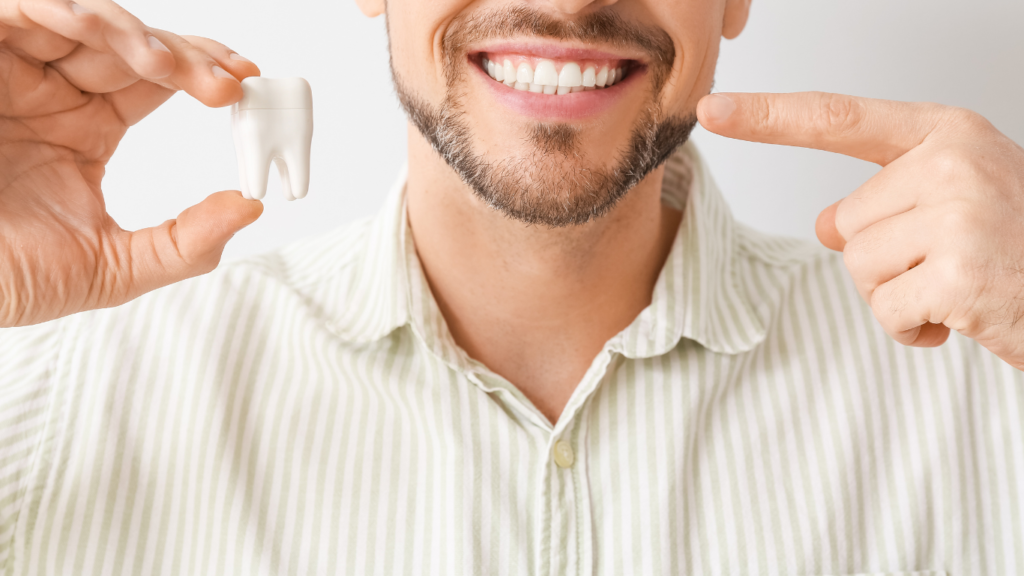Are you tired of wincing every time you indulge in your favorite ice cream or sip on a hot cup of coffee?
Tooth sensitivity can be a real buzzkill, affecting your daily life and enjoyment of certain foods and beverages. If you’re nodding in agreement, you’re not alone. The Academy of General Dentistry estimates that at least 40 million adults in the United States suffer at some time from sensitive teeth.
The good news is that there are practical steps you can take to relieve tooth sensitivity and discomfort. In this article, we’ll explore some helpful tips to make your pearly whites less sensitive.
Understanding Tooth Sensitivity
Tooth sensitivity occurs when the protective enamel on your teeth wears down, exposing the underlying dentin and nerve endings.
This can happen due to various reasons, including aggressive brushing, gum recession, cavities, teeth grinding, and more. Once these nerve endings are exposed, they can react to temperature changes and certain foods, causing discomfort.

Tips for Relieving Tooth Sensitivity
1. Gentle Brushing Techniques
Start by reevaluating your brushing technique. Use a soft-bristled toothbrush and gentle, circular motions to clean your teeth.
Avoid applying too much pressure, as aggressive brushing can contribute to enamel erosion and increased sensitivity. One way to see if you’re brushing your teeth too hard is to simply look at your toothbrush. If the bristles are pointing in multiple directions, you’re brushing too hard.
2. Choose the Right Toothpaste
Certain toothpastes contain abrasive ingredients that may be too harsh for people who have sensitive teeth.
For example, sodium pyrophosphate, the key ingredient in tartar-control toothpaste, may increase tooth sensitivity.
Look for desensitizing toothpastes that are specifically formulated to help alleviate tooth sensitivity.
These toothpaste varieties often contain compounds that block nerve signals, providing relief over time. Make sure to use consistently for the best results, as these products typically need to be used for at least a month before any benefits are noticed.
3. Avoid Acidic Foods and Drinks
Acidic foods and beverages can contribute to enamel erosion, exacerbating tooth sensitivity. If you do consume them, rinse your mouth with water afterward to help neutralize the acidity.
Some examples of foods and drinks that can worsen teeth sensitivity:
- Coffee
- Pickled foods
- Citrus fruits
- Carbonated beverages
- Sports drinks
- Tomatoes
- Dried, sticky fruits
- Fruit juice
4. Use a Fluoride Mouthwash
Fluoride strengthens enamel and helps to remineralize your teeth, reducing sensitivity. Incorporate a fluoride mouthwash into your oral hygiene routine, swishing it around your mouth for the recommended time before spitting it out.
5. Use a Saltwater Mouthwash
By temporarily raising your mouth’s natural pH, a saltwater mouthwash creates an oral environment that is not conducive to bacterial growth, which can wear down enamel and expose your dentin, worsening tooth sensitivity.
A saltwater mouthwash can help alleviate pain not only from tooth sensitivity, but also pain caused by mouth sores and tooth damage, all the while freshening breath and reducing inflammation.
Gargle and swish with a warm saltwater solution (8 oz. warm water and 1 tsp of table salt) twice per day for best results. Expel and repeat until gone.
6. Mindful Teeth Grinding Prevention
If you’re prone to teeth grinding or clenching, especially during sleep, consider using a nightguard. This dental appliance helps protect your teeth from excessive wear and tear, preventing sensitivity caused by grinding.
Aside from bruxism during sleep, it’s not uncommon for people to clench their jaw during the day as a reaction to stress and anxiety, and can also contribute to tooth sensitivity.
7. Oil Pulling
Oil pulling is one way to promote a cleaner and healthier mouth, and involves rinsing your mouth with a natural, food-grade oil (melted coconut oil, for example) to help draw out harmful bacteria and toxins and prevent new bacterial growth.
Oil pulling is also an effective way to moisturize your gums and promote saliva production, helping sanitize your mouth.
8. Regular Dental Checkups
Schedule regular dental checkups to identify and address any underlying dental issues that may contribute to sensitivity.
Dentists also have a variety of methods to especially address tooth hypersensitivity, including both in-office treatments and products for home use.
For instance, if you are diagnosed with dentin hypersensitivity, your dentist may apply a desensitizing agent or a protective coating.
It’s common to be prescribed a stannous fluoride gel or an over-the-counter desensitizing toothpaste containing fluoride and either potassium nitrate or strontium chloride, which can be massaged onto your gums with your finger.
These ingredients help block the transmission of sensation from the tooth to the nerve.
You may also consider speaking with your dentist about getting a dental varnish or coating, which adds a layer of protection to your teeth, and can be another solution to teeth sensitivity.
9. Hydration and Balanced Diet
Stay well-hydrated and maintain a balanced diet rich in calcium, magnesium, vitamin K2 and phosphorus, essential minerals for healthy teeth. These nutrients contribute to enamel strength and can help reduce sensitivity.
10. Quit Smoking
Smoking not only stains your teeth but can also contribute to gum disease, leading to sensitivity. Quitting smoking can improve your overall oral health and reduce sensitivity over time.
11. Address Gum Disease
Tooth sensitivity can also be a symptom of gum disease, also known as Periodontal disease, which affects nearly half of adults over the age of 30, and is commonly caused by plaque buildup.
Aside from tooth sensitivity, other symptoms of gum disease may include:
- Pain and swelling in the gums.
- Chronic bad breath.
- Receding gums.
- Loose or sore teeth.
- Bleeding from your gums.
Left untreated, gum disease can lead to an array of consequences, including chronic mouth pain, difficulty chewing and tooth loss.
If you’re experiencing symptoms of gum disease, schedule an appointment with a dental practitioner to course-correct and find relief.

Modern Day Dental | St. Johns, FL
Remember, consistent and gentle oral care, along with professional dental guidance, is key to achieving lasting relief.
If you’re experiencing persistent sensitivity and are located in or around St. Johns, Florida, don’t hesitate to reach out to our team at Modern Day Dental for personalized advice and treatment options!

